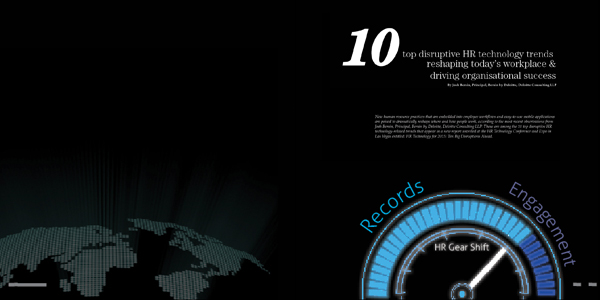
New HR practices that are embedded into employee workflows and easy-to-use mobile applications are poised to dramatically reshape where and how people work, according to the most recent observations from Josh Bersin, Principal, Bersin by Deloitte, Deloitte Consulting LLP. These are among the 10 top disruptive HR technology-related trends that appear in a new report unveiled at the HR Technology Conference and Expo in Las Vegas entitled: HR Technology for 2015: Ten Big Disruptions Ahead.
Such workflow-embedded HR practices and mobile applications will allow employees to learn on demand, share work experiences in real-time, update goals on-the-go, and provide real-time data that ultimately can help leaders make better management decisions. The report highlights additional disruptive, technology-related developments for HR and business leaders to consider in planning their technology roadmap for the year ahead.
Bersin commented, “The HR technology market, which is now more than USD 15 billion in software alone, is exploding with growth and innovation. One of the most disruptive changes is the trend toward automating HR practices and integrating systems, making them so easy to use that people think of them as part of their daily life. By embedding and automating HR practices into applications employees use every day, HR ‘systems of record’ are becoming ‘systems of engagement.’ At the same time, these systems give leaders the real-time information they need to adapt to changing business and labour conditions.”
By weaving many HR processes into employees’ daily workflow, solution providers are making it easier and simpler for people to update their status, find their benefits, locate other skilled people, find and take courses, assess job candidates, complete onboarding for a new job, and set or monitor goals. Bersin explained, “Think about goal management—our research shows organisations that revise their goals quarterly or more frequently are nearly 50% more likely to have above-average customer satisfaction and 65% more likely to be effective at controlling costs than those organisations that only revise their goals once per year. So why wouldn’t the HR system facilitate this agile, continuous goal management process? Many startups are now focused here.”
While the shift in the purpose of software from ‘systems of record’ to ‘systems of engagement’ may be the most profound issue impacting HR technology today, additional disruptive trends include the following:
Mobile is everything: mobile applications, such as online learning and goal setting, are positioning the phone to become the primary interface for all HR- related applications.
Analytics-driven, science-based solutions: one new solution looks at real-time labour activity and, using analytics techniques, shows companies how to save millions of dollars in payroll expense without reducing any worker flexibility or productivity.
Science of leadership, assessment, and psychology evolves with Big Data: a new set of companies are emerging that bring together traditional assessment with big data and what may be called ‘social sensing’ to help organisations better understand the relationship between skills, personality and organisational culture.
Sensing, crowdsourcing and the ‘Internet of Things’: companies now are looking at ways to capture continuous data about hourly employees (time worked, schedules), high potentials (are they threatening to leave, how are they feeling about work or their managers), and leaders and staff (how are they performing, why are some people performing better).
Radical changes to recruiting: thanks to new online job information and networking sites, we now source, attract and recruit candidates through what we call ‘network recruiting’.
Dramatic changes to performance management and talent mobility: a new breed of performance management tools and approaches now includes features for regular check-ins, transparent sharing of goals, and agile team management.
Learning management systems (LMS) change and market expands: new LMS technologies now integrate learning with talent and performance management. They include integrated content and expertise management, and they often have integrated collaboration, recommendation engines and tools.
HR management systems (HRMS) and talent management merge: all major HRMS vendors offer recruitment, performance management, talent management, analytics and most offer learning solutions along with their core HRMS and payroll applications.
Technology-savvy vendors will likely outpace their peers: winning vendors will likely have agile, highly-expert teams, and will likely release new features and interfaces every few months. They also are expected to adapt their products rapidly as technology, user experience and client demands change.
By Josh Bersin, Principal, Bersin by Deloitte, Deloitte Consulting LLP





